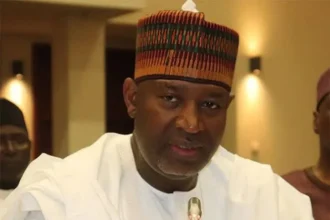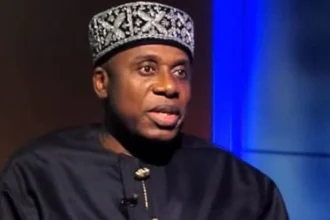...To get all news updates, Join our WhatsApp Group (Click Here)
Also Join our WhatsApp Channel (Click Here)
Ali Ndume, former Senate majority leader, has reacted to the Senate’s decision not to confirm Ibrahim Magu, as chairman of the Economic and Financial Crimes Commission (EFCC) based on allegations leveled against him.
According to Ndume, if Magu should not be confirmed based on allegations levelled against him, then he should not be a sitting senator and Bukola Saraki should not be there as Senate president.
Ndume made this known while speaking on Sunrise Daily, a breakfast programme on Channels Television.
He faulted the action of the Senate to reject Magu’s nomination.
He said: “We have all been accused, I have been accused of sponsoring Boko Haram, the senate president is still going to court.
“Same as other members who have cases in court, yet they occupy seats in the senate. So, if you say because of the allegations he (Magu) should not be confirmed, then I should not be a sitting senator and Saraki should not be there as senate president.”
Ndume, who said he conducted personal investigation on Magu, absolved him of the allegations.
He added: “The bottom line is that we are trying to fight against corruption and if we ask: ‘is Magu doing his job?’, the answer is yes, undoubtedly. He is not an actor, he is a policeman doing investigation. He is not supposed to talk about what his job is in an articulate manner, it’s not important. What he is doing is not a TV show.”
The former Senate majority leader also said that he would be surprised if President Buhari mentioned Magu’s confirmation during his last meeting with leaders of the national assembly.
Buhari met Saraki and Yakubu Dogara at the presidential villa in Abuja, a day to the day Magu was rejected at the senate.
He said: “The president I know is not the kind of person that would interfere in such matters. I would have been surprised if the president discussed the issue of confirmation when he met the leaders of the national assembly recently, that would have led to the issue of lobbying for him to be confirmed.
“There is no crime against lobbying, in fact we are supposed to lobby. I lobbied most of the senators but sometimes you keep on learning because this is kind of new. A government where you (APC) are in the majority and the president re-nominates a candidate, and also in a situation where the issue at stake is an accusation; in the normal circumstance and by our constitution, accusation is not conviction.
“The issue now is not the house in his name, it’s a house called the safe house and that was prompted because after his acting appointment and the rigorous work he is doing, you can’t afford to have somebody like that living in Karu or a densely populated area.”
Recall that the upper chamber on Wednesday, March 15, rejected the nomination of Magu as EFCC boss, citing a report of the Department of State Services (DSS).
The DSS had said Magu was unfit to lead the commission because he had failed an integrity test.
You can get every of our news as soon as they drop on WhatsApp ...To get all news updates, Join our WhatsApp Group (Click Here)
Also Join our WhatsApp Channel (Click Here)










